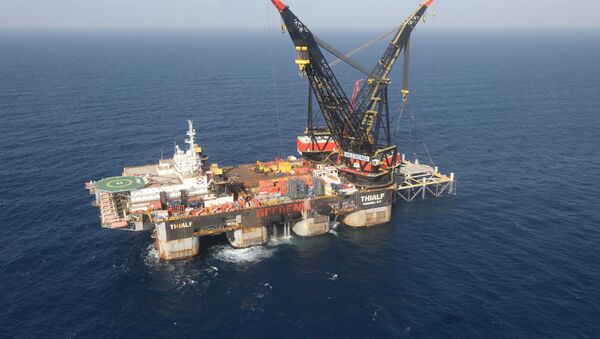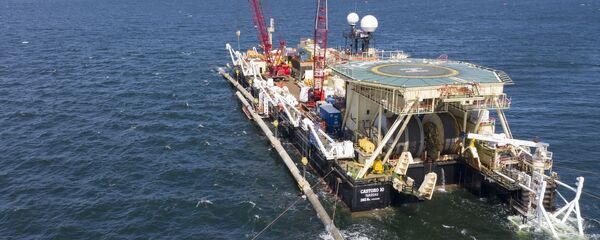Why has this happened now? Is the decision to construct a gas pipeline an attempt to prevent Turkey from implementing its own plans in the Mediterranean? What do Arab countries and other countries in the Eastern Mediterranean think about this project? Sputnik has talked to experts to find out.
Timing and Payments
Israel ratified the project almost six months after the ministers of Greece, Cyprus, and Israel signed the corresponding agreement. Avinoam Idan from the Chaikin Centre for Strategic Studies and Research Centre for Maritime Strategy at Haifa University explained why this happened.
“The dialogue between parties takes much time. Therefore, Israel was ready to ratify the agreement only now, when the last details have been discussed. This is a multilateral project, so it took quite a long time”, he said.
Speaking about the project’s expected benefits, the expert added that “the countries involved in the pipeline construction are planning to invest about €6 billion in the project. The pipeline will only be constructed by 2025.
It’s only then that we will find out the approximate amount of profit we can get. Moreover, the pipeline launch is a matter of strategic partnership for the Eastern Mediterranean. More specifically, it can be characterised as a general response to the Turkish challenge. However, the economic cooperation between Israel, Greece, and Cyprus can in no way harm Turkey or challenge it”, he added.
Problems With Neighbours
Laying the pipeline is also not easy: Israel’s maritime borders with Lebanon are not demarcated; in particular, there may be problems in the gas shelf zone.
“We have long offered Beirut to demarcate borders at sea. This is both in our interests and in the interests of our Lebanese counterparts – we don’t need any diplomatic relations to do this. I don’t think the gas issue is worth stirring up a scandal. But the problem is that Lebanese politics is controlled by Hezbollah; it is extremely difficult to establish cooperation with Beirut in this context”, Avinoam Idan said.
At the same time, according to the expert, Lebanon could also benefit if it were involved in the gas pipeline cooperation.
“It is beneficial to everyone. Moreover, Lebanon’s economy is not at its best at the moment, and the situation could somehow be improved by Lebanon taking part in the gas pipeline construction and operation”, he concluded.
Attempt to Pressure Egypt
In turn, Ramadan Abu el-Ela, an Egyptian petroleum engineering expert from the University of the Suez Canal, believes that it will be technically difficult to implement this project. At the same time, he considers the project an attempt to put pressure on Egypt - to make the country make concessions regarding logistics and gas transfer to the Mediterranean.
“Before talking about the damage this project can cause to Egypt, we need to understand the possibilities of implementing this project. Let me remind you that a similar idea was considered back in 2015, but at that time they wanted to extend the line to Limassol. But the pipeline proved to be economically ineffective. The current attempt to construct a pipeline is more like a desire to pressure Egypt, currently the largest gas supplier in the Mediterranean”, he said.
Speaking about pressuring Egypt, the expert added that “they will economically benefit from using this gas pipeline only in cooperation with Egypt: in other words, using our infrastructure. Otherwise, the pipes will have to be laid too deep. It will be expensive and inefficient. But Cairo doesn’t want to use the language of pressure – let them first offer favourable conditions”.
What Will Lebanon Say?
Lebanese oil expert Rabia Yahi believes that the project in itself is rather promising, at least for the gas consumption of the Mediterranean countries.
“From an economic perspective, the project is extremely promising. If the three signatories to the agreement manage to convince Egypt to take part in it, the gas pipeline will be able to provide quite effective and necessary competition to Russian gas supplies”, he said.
At the same time, the Lebanese expert noted that it is more profitable for Lebanon to establish energy cooperation with Turkey due to geopolitical circumstances.
“In fact, it would be interesting to consider this project, even despite Israel’s participation in it. But the regional geopolitics is such that it is more profitable for Beirut to lay the pipeline from Turkish territory. After all, such a project is safer for Lebanon – perhaps even cooperation as part of the TurkStream. Moreover, it’s much more profitable for us to buy Russian gas than regional gas”, Yagi explained.
Doubts Regarding Implementation
However, Greek energy specialist Ioannis Michaletos believes the pipeline may not be constructed at all.
“EastMed is a competitor to TAP. If built, it will ultimately damage TAP and not Russian pipelines. The combined design capacity of Nord Stream and Nord Stream-2 is 110 billion cubic metres of gas per year; together they provide much cheaper gas via closer routes, therefore EastMed is no competition to them”, he said.
At the same time, the expert doesn’t rule out that the global crisis caused by the pandemic will affect the EastMed's construction: “There is a decrease in consumption and prices due to the coronavirus. The project may not be economically viable due to current prices. Let’s not forget that if the current [economic] situation is long-term, any investment will be difficult”.
In turn, according to Turkish energy specialist Volkan Aslanoğlu, implementing the EastMed gas pipeline project is illogical.
“Considering, in particular, the global trends in the gas market and economic concerns, this project is not logical or realistic. However, if the EU accepts cost development for the sake of improving energy security and expanding supplies, as well as establishes a strategic reserve in this region, this project can be considered feasible. Even in this context, a very assertive policy is needed in the Eastern Mediterranean. Turkey’s policy has allowed the country to almost completely finish drilling operations and seismically explore the region over the past five years. Demonstrating such determination will be a serious challenge for the EU”, he said.
The Eastern Mediterranean gas pipeline project is currently in the early development stage.




